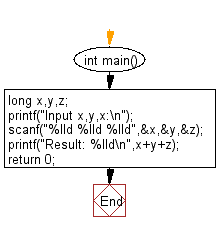C Exercises: Calculate for each pair of integers x, y and z
C Basic Declarations and Expressions: Exercise-89 with Solution
Write a C program to calculate (x + y + z) for each pair of integers x, y and z where -2^31 <= x, y, z<= 2^31-1 .
Sample Solution:
C Code:
#include <stdio.h>
int main()
{
long x,y,z;
printf("Input x,y,x:\n");
scanf("%lld %lld %lld",&x,&y,&z);
printf("Result: %lld\n",x+y+z);
return 0;
}
Sample Output:
Input x,y,x: Result: 140733606875472
Flowchart:

C programming Code Editor:
Contribute your code and comments through Disqus.
Previous:Write a C program to create an extended ASCII table. Print the ASCII values 32 through 255.
Next: Write a C program to find all prime palindromes in the range of two given numbers x and y.
What is the difficulty level of this exercise?
Test your Programming skills with w3resource's quiz.
C Programming: Tips of the Day
Static variable inside of a function in C
The scope of variable is where the variable name can be seen. Here, x is visible only inside function foo().
The lifetime of a variable is the period over which it exists. If x were defined without the keyword static, the lifetime would be from the entry into foo() to the return from foo(); so it would be re-initialized to 5 on every call.
The keyword static acts to extend the lifetime of a variable to the lifetime of the programme; e.g. initialization occurs once and once only and then the variable retains its value - whatever it has come to be - over all future calls to foo().
Ref : https://bit.ly/3fOq7XP
- New Content published on w3resource:
- HTML-CSS Practical: Exercises, Practice, Solution
- Java Regular Expression: Exercises, Practice, Solution
- Scala Programming Exercises, Practice, Solution
- Python Itertools exercises
- Python Numpy exercises
- Python GeoPy Package exercises
- Python Pandas exercises
- Python nltk exercises
- Python BeautifulSoup exercises
- Form Template
- Composer - PHP Package Manager
- PHPUnit - PHP Testing
- Laravel - PHP Framework
- Angular - JavaScript Framework
- Vue - JavaScript Framework
- Jest - JavaScript Testing Framework
